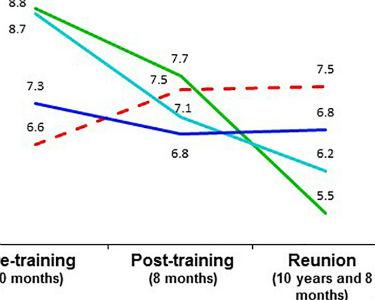
STRRIDE (Studies Targeting Risk Reduction Interventions through Defined Exercise) was an eight-month exercise study conducted from 1998–2003. Subjects were randomized to control or one of three exercise groups differing in intensity and amount. To determine if there were legacy effects, 104 subjects from the Duke site returned for testing.
The recently published findings suggest persistent benefits of exercise years later, even if one did not continue to exercise. Most of the control group participants in the original study, had larger waistlines, were less fit, and had lost around 10 percent of their aerobic capacity. Those in the exercise groups exhibited various improvements of several measures.
Taken as a whole, these results suggest that “exercise is a powerful modulator of health, and some effects can be quite enduring,” says DMPI faculty member William Kraus, who oversaw the new study. The effects also can differ, depending on how hard someone works out, he says. To build and maintain high endurance, we may have to sweat and strain. But to better our metabolic health, a walk likely will do.
